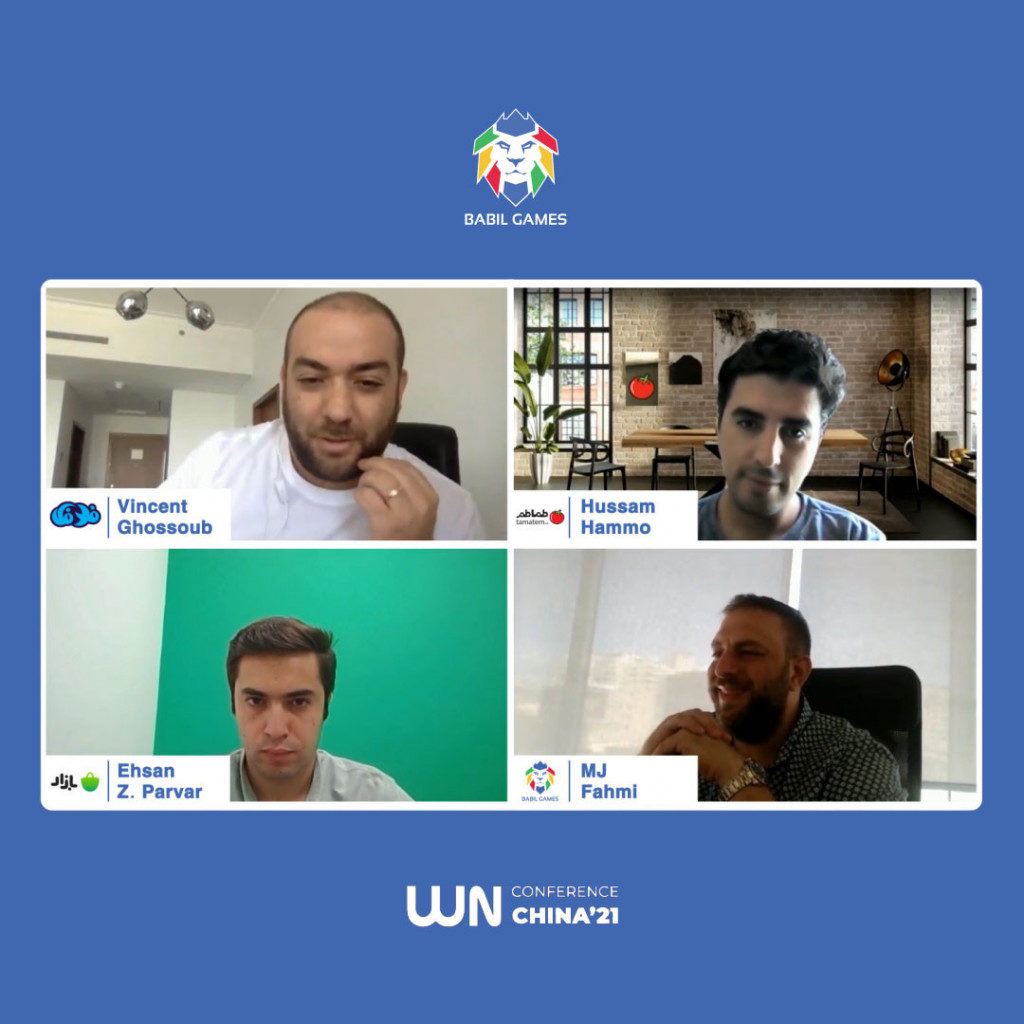
- May 31, 2021
WN CONFERENCE CHINA’21 – THE GAMING INDUSTRY: MENA & CHINA
WN Media Group organized the WN conference China 21: a virtual discussion panel that was aimed at looking further into the MENA region’s and China’s cooperation up to this point, as well as how it will look in the upcoming years. In order to gain a deeper understanding of the mobile gaming industry in the MENA region, MENA-based companies and organizations came together to share essential insights and experiences gained from working in the mobile games industry.
The discussion was moderated by Vincent Ghossoub, Founder of Falafel Games, with guest speakers MJ Fahmi, CEO & Co-Founder of Babil Games, Hussam Hammo, CEO and Founder of Tamatem Games, and Ehsan Z. Parvar, Senior International Business Developer at Cafe Bazaar.

Why do game developers need a strong game publisher?
The discussion started with MJ Fahmi clarifying why a competent game publisher is vital, and highlighted what problems the Chinese game development companies could confront if they publish their games without the support of an expert game publisher in the MENA region. “Why do the Chinese developers need a good publisher (specifically in the MENA region)?” Well, for several reasons; most importantly the localization and culturalization. It is not a translation. “We always say that understanding the habits and understanding the culture in the MENA region is very important to a game’s success”, MJ Fahmi stated.
He continued to give examples on the practices the Chinese developers adopt when publishing a mobile game on their own in the MENA region, “We have seen a lot of examples from Chinese developers trying to translate and, specially, all of them try to put an Arab character wearing the ‘Dishdasha’ and ‘Shemagh’ – Traditional attire for Arab men- and similar things. This is definitely only a step or part of the culturalization, but doing that does not mean you reached the Arab customer and your game will be the next success.”
MJ also highlighted that some cases are a success yet they still need a strong mobile games publisher – “We have one or two examples of Chinese games being in the top grossing games in MENA, but these games are not only top grossing in MENA, they are also top grossing worldwide! Yes they did amazing with their job in the MENA region but what most people don’t see is how many failures of studios, especially from Asia and China, that tried to enter the MENA market”. He confirmed that you need a good local publisher whether it’s the MENA region or any other region you’re not familiar with as a game developer.
What does a local game publisher do?
MJ Fahmi stated “ We do everything from A-Z!“
- Localization
- Culturalization
- Community Management
- Customer Support
- User Acquisition
You Name it!
“It is about live operations. We read and live with our players, getting feedback from them whether it’s technical or simply what they like and don’t like. We have dedicated teams, who speak in Arabic, that collect that information. Based on that we do our live operations and we shape future events and updates for the game”, MJ Fahmi said.
What are the main events in the MENA region?
When expanding into a new region, knowing the important events and special occasions in the region you are operating in is essential. It will help with the company’s connection with the players, and will support the team in making sure the reward system or in-game events are placed in the right timeframe to make sure you receive positive behavior and feedback.
To understand the MENA region market MJ Fahmi talked about the main region-based events:
- The Holy Month of Ramadan
- Eid Al-Fitr
- Eid Al-Adha
As well as country-based events which are also important such as; national days and national holidays.
Is there a model for the developer to publish a game, possess full global rights and retain the fundamental principles of the game without the interference of a game publisher or to prevent sharing the revenue with a third party?
MJ Fahmi said, “Publishers always face that issue with the developers, and we, Babil Games, don’t want to reach that point for several reasons: for the purpose of the live operations, and because we use different tools than them, and so it becomes very hard and limiting when it’s done that way – it becomes hard mainly on the Customer Support, Analytical, and Marketing teams. So it is always better to give the publisher the space he needs”.
Hussam Hammo added that the driver for the developer is mainly the revenue. “The developers believe that if they publish their own game, then they are keeping the 30% or 70% to themselves. But eventually they will end up making less money if they do it themselves, because the local publishers have more access to users and more access to look alike audiences, and similar audiences through their previous games, so it will be cheaper for the publisher to acquire good quality users.”
Is Arabic the only spoken language in the MENA region?
One of the key factors to understand the MENA region as a whole is to focus on the fact that there is more than one language spoken and that there are multiple cultures and behaviors in almost every country in the region. Ehsan Z. Parvar focused on this point when he was asked by Vincent Ghossoub if there are similar themes and consumer behaviors in the Iranian market, where they speak Persian. Ehsan Z. Parvar said “We have three main languages: Arabic, Persian and Turkish”.
As for the similarities and differences between Arabic-speaking countries and Persian-speaking countries, Ehsan mentions that “Arabic and Persian are very similar languages, where the alignment and the alphabet are the same.” He also added that the culture is similar because the majority are Muslims so therefore, the marketing campaigns and events are the same.
As for the differences, he stated that “things here are more local, we have a local mobile application store and the majority here use it instead of Google Play, for example, because the payment is not accessible through such platforms”, he continued, “the other difference is the local marketing tools and channels. For example, we have other VOD services here that we use for running marketing campaigns instead of YouTube, and we also have our own websites and AD networks, so dealing with these things requires deep knowledge that we have gained through many years.” So much more interesting information was tackled in this conference!
Watch the full panel discussion here: https://www.youtube.com/watch?v=H1bOJ86PYAQ







